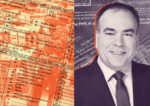Cook County homeowners will shoulder most of the burden of property tax increases this year, particularly those in south and southwest suburbs, where the median tax bill surged a record 19.9 percent.
The largest increases — 30 percent or more — were recorded in 15 south suburban cities, 13 of which are home to mostly lower-income Black residents, according to a 2023 tax bill analysis by Cook County Treasurer Maria Pappas. The median tax bill for homeowners more than doubled in two towns, Dixmoor and Phoenix.
This finding once again demonstrated “the stark inequities in the Illinois property tax system” the tax bill analysis concluded.
The tax burden on individual homeowners has grown over decades of residents being displaced and businesses being shuttered as the taxes levied by local governments increase, Pappas said.
“If you add government expenses going up with people leaving, the only thing left — the only people that you can charge — are the people who are left,” she said.
Chicago’s Black population has been declining steadily since 1980, when it peaked at 1.19 million residents. By 2017, it had dropped by a third, a decline of 390,652 residents, according to a report by the University of Illinois Chicago’s Great Cities Institute. The quickest decline spanned from 2000 to 2010 when over 181,000 Black residents were displaced, many of them from South Side communities hit hard by the 2008 foreclosure crisis.
With this, businesses closed and commercial properties riddled with vacant units have passed off more and more of the tax burden onto homeowners, Pappas said.
At the same time, local taxing bodies, like school districts, often have fixed overhead costs that remain the same even if there are fewer residents or fewer students attending school. On average, taxes levied by school districts account for 60 percent of property tax bills, Pappas said.
Across the county, homeowners will take most of the hit with this year’s increases, as nearly 84 percent of Cook County homeowners are set to receive a higher bill than last year.
Property taxes rose by nearly $706 million, from a total taxation of $17.6 billion to $18.3 billion, according to Pappas’ analysis. That is an annual increase of 4 percent, just below last year’s inflation rate of 4.1 percent.
Most of the burden falls on homeowners, who will be asked to pay $611 million more than they did last year – about 90 percent of the overall tax increase.
The remaining $102.9 million in increases will fall on commercial properties, according to the analysis.
But residents of communities on the south and southwest sides of the county are by far the most impacted. Homeowners in this region alone will be billed for $265.4 million, or 38 percent, of the overall tax increase, according to Pappas’ analysis.
That’s because, following area reassessments conducted by Cook County Assessor Fritz Kaegi, many businesses successfully appealed to have their property tax values decreased by the Cook County Board of Review, according to the analysis.
These Board of Review adjustments play a big role in determining the property values of businesses versus homes and, thus, who carries more of the burden of property tax hikes, according to a news release from the Assessor’s Office issued Thursday.
Kaegi’s reassessments would have shifted about less than 1 percent of the tax hike’s burden onto commercial properties but, after the Board of Review was finished, 4 percent of the burden had been shifted away from businesses and onto homeowners.
The assessed value of commercial properties decreased $950 million, or 18 percent, during the appeals process conducted by the Board of Review, according to the release.
The increased burden on homeowners in south and southwest suburbs is also due to “significant increases” in tax levies passed by the county’s school districts (up 6.1 percent), as well as localities and other taxing bodies, according to the analysis.
Nearly 10,300 homeowners in the region paid nothing in property taxes in recent years because tax breaks they received for being senior citizens or low-income homeowners exceeded the assessed value of their homes. With recent reassessments, nearly 4,200 homeowners who paid nothing last year were billed for a total of $6.2 million, an average of $1,476 per taxpayer.
Many south and southwest Cook County communities are home to predominantly low-income residents and have previously reported low collection rates, according to the analysis. If homeowners cannot afford to pay their tax bills, their cities and schools could struggle to fund essential services.
In this way, the inequities in the state’s property tax system can have a cyclical effect, Pappas said.
“We can write about it. You can offer solutions, but if you don’t go to the next step at the state of trying to fix it, everything stays the same,” she said. “You don’t go forward. You don’t go backwards. You just march in the same place. And they’ve been marching in the same place for 30 years.”
Read more


This year marked at least 30 consecutive years of property tax increases in Cook County, according to Pappas, who has served as treasurer since 1998.
This is also the first year that people will see a more clear breakdown of “Where Your Money Goes,” on the front of the second installment of their 2023 tax bills, Pappas said.
She said she hopes her team’s annual property tax bill analysis helps to educate homeowners and business owners about their tax bills, but that it also might inspire them to push their representatives in Springfield to make the state’s property tax system more equitable.
Editor’s note: This story has been updated to clarify the role of the assessor’s office in determining property tax values.
